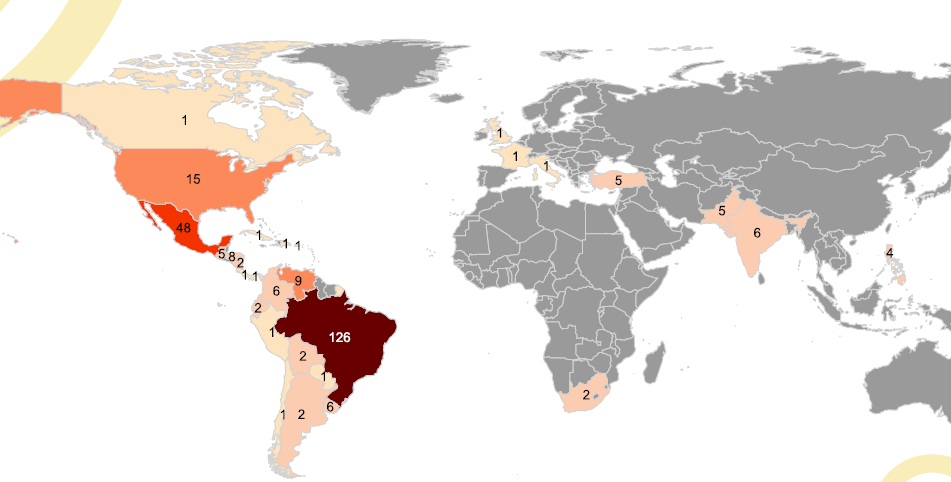RIO DE JANEIRO, BRAZIL – A week after Brazil broke the record for transgender people elected in municipal elections, new data from the Trans Murder Monitoring show that in the first nine months of 2020 alone, 124 transgender people were killed in Brazil.
As a result, the country ranks among the most violent for this population for the 12th consecutive year. Mexico and the United States come next, with 48 and 15 reported murders, respectively.

Due to their rejection by their families and also by the labor market, the overwhelming majority of transgender people are forced to earn a living in casual labor, particularly prostitution. The combination of this adverse situation with the Covid-19 pandemic and the worldwide rise in police brutality makes 2020 one of the most violent years for the trans population.
By September alone, there were 350 reported murders – an increase of six percent over the whole of last year. Of these murders, 82 percent occurred in Latin America, with 43 percent in Brazil, where local data is compiled by the National Association of Transvestites and Transsexuals (ANTRA). In addition to Black Awareness this Friday, November 20th, the International Transgender Day of Remembrance is also celebrated.
Family rejection, economic marginalization and, above all, impunity for violence are some of the factors that explain the ongoing rise in these numbers year after year. But in Brazil, hate speech from high ranks in public administration further exacerbates this reality.
“When a President of the Republic proudly says something homophobic, it is a signal to Brazilians that they can do the same,” explains Cristian Cabrera, a Human Rights Watch researcher. “It encourages violence because it suggests that people will not be punished for their violent behavior.”
A psychologist and coordinator of the Acolhe LGBT project, of All Out, which offers qualified psychological assistance to vulnerable LGBTs, Carú Seabra points out that a good part of transgender murders are quite cruel and generally occur in public places. According to the Trans Murder Monitoring, 38 percent of reported murders occurred on the streets.
“This shows how difficult it is to be trans in Brazilian society. It’s not surprising that, in a moment of crisis, the trans existence becomes even more difficult,” says Carú, a trans man. In his opinion, the right to use the social name (regulated in Brazil since 2018) and the record of elected trans people is only one of the countless steps that need to be taken “so that this population may live, and not merely survive. One of these steps, he points out, is the inclusion of trans people in the formal labor market.
“We need to be recognized as potentials that can produce as much as, equal to or better than, any cisgender person [who identifies with their biological sex],” argues Carú. “To recognize this is to recognize our humanity.”
For Cabrera, reducing inequalities and providing greater dignity to the trans population implies that the authorities recognize the existence of such violence and invest in an education that promotes tolerance and acceptance of all people, regardless of sexual orientation or gender identity. “Today, there are attempts to block gender debate in schools. This not only violates the right to education, but also enhances prejudice in Brazilian society,” he explains, arguing that the private sector can also contribute to the cause.
“CEO’s should make it clear that diversity is welcome in their companies and that no kind of discrimination should be tolerated. This sends the message that transgender people exist and that the private sector recognizes their capabilities and contributions as they do with all other employees,” said Cristian Cabrera, a Human Rights Watch researcher.
Source: Exame

